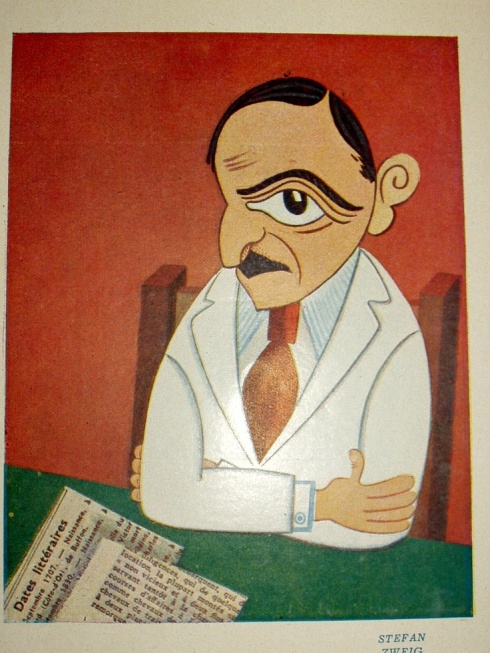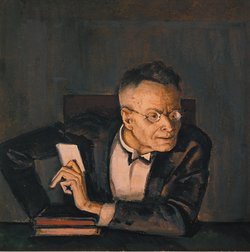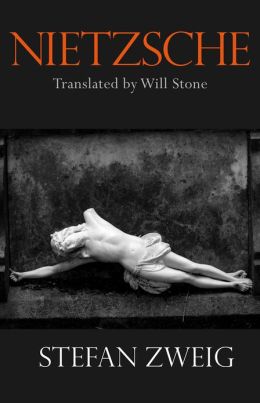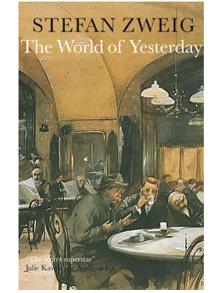The titanic edifice of information (not to confused with the Tower of Babel)constructed over the millennia of human history is now instantaneously available to those privileged to have access to current technology. One consequence of this is an overflowing dustbin of history—it seems that the more there is to remember the more there is to ignore or forget. But for two small (but mighty)publishers,Pushkin Press and New York Review Books, Viennese writer Stefan Zweig, who was born amidst the splendor of late 19th century high culture and died as the horrors of mid 20th century enveloped the world, might be consigned to dusty book stacks occasionally accessed by a dwindling population of scholars.Leo Carey in the New Yorker</em comments:
Zweig’s death arguably marked the high point of his literary standing: to most English-speaking readers, he is now little more than a name.
Upon seeing Jonathan Franzen’s recent The Kraus Project(Farrar Giroux Straus)it occurred to me that perhaps the wrong fin-de siecle Viennese Jewish intellectual was being rescued from the aforementioned dustbin of history. Now it is the case that for a time in my impressionable youth I was a fan of Karl Kraus whose iconoclastic aphorismswere nourishment to hungry, young dissidents (“How is the world ruled and led to war? Diplomats lie to journalists and believe these lies when they see them in print.” Or “A writer is someone who can make a riddle out of an answer.” Or, “Psychoanalysis is that mental illness for which it regards itself as therapy). Michael Hoffman, poet, scholar, translator< writes authoritatively on Kraus and the middle European culture and in the process puts Franzen and his co-conspirators in their places:
It is rare for Kraus to be called anything less than brilliant, even though it’s sometimes said with a there-now-go-away-please undertone. I find his writing too artificial, too conniving, and above all too squalid to rate brilliant. Surely nothing brilliant would accommodate as much opacity (or shameless triviality…
Another commentator, Jacob Mikanowski,also has fun with Franzen:
.
..the Butch Cassidy and Sundance Kid of cultural criticism drawn together across the gulf of a century to take on all comers. It doesn’t quite work out that way though. Reading Kraus’s sinuous, hectoring, almost impenetrable prose alongside Franzen’s peevish, ill-spirited footnotes is a strange and rather discordant experience, like receiving a deep tissue massage while being spat on from a great height.
But I digress.
Stefan Zweig was born in Vienna in 1881 (November 28) to wealthy Jewish parents “My mother and father were Jewish only through accident of birth”, Zweig later wrote. He studied philosophy at the University of Vienna and in 1904 earned a doctoral degree writing his thesis on “The Philosophy of Hippolyte Taine”. Though not an observant Jew, he did write repeatedly on Jews and Jewish themes and though he was an internationalist and espoused pan-europeanism, he was friendly with Zionism’s founder Theodore Herzel when Herzel was editor of the Vienna’s influential Neue Freie Presse and published some of Zweig’s early writing. For a time, in the nineteen-twenties and thirties, Zweig was the most translated writer in Europe. For example, he was able to fill Carnegie Hall and among other things spoke at Sigmund Freud’s funeral. Zweig’s pacifism saw him serving in the Archives of the Ministry of War during WWI and he maintained a commitment to pacifism his entire life. Zweig married Friderike Maria von Winternitz in 1920 and though they divorced in 1938 she remained an important figure in his life, writing a memoir Married to Stefan Zweig after his death. Helen Epstein points out:
… I find Friderike’s memoir an invaluable document. In The World of Yesterday, Stefan aimed to write a memoir of his generation; in Married to Stefan Zweig, Friderike was interested in portraying the man, filling in details in her memoir that Stefan left out of his. Her book has provided a template for subsequent biographers, including Donald Prater, who often drew verbatim from it in European of Yesterday (1972) and Oliver Matuschek in Three Lives: A Biography of Stefan Zweig (2011).
Zweig fled Austria following the rise of the Nazis, living in London later moving to Bath when England entered the fray(one of the cruel absurdities of the war,Zweig was classified an enemy alien. As the Nazis conquered Western Europe, Zweig and his second wife, Lotte, traveled to New York — he briefly resided in Ossining NY, and shortly thereafter (Aug 1940) he further removed himself to Brazil, to the then backwater town of Petrópolis. On February 23, 1942, the Zweigs were found dead in their bed, holding hands. Nearly a decade of rising totalitarianism , escalating depression , overpowering feelings of hopelessness had taken its toll:
I think it better to conclude in good time and in erect bearing a life in which intellectual labour meant the purest joy and personal freedom the highest good on Earth.
News of Zweig’s death was carried on the front page of the New York Times.
Three Lives: A Biography of Stefan Zweig by Oliver Matuschek,translated by Allan Blunden(Pushkin Press)
This recent biography gets good marks for a conscientious account of the details of Zweig’s live and lesser ratings for his indifference to Zweig’s body of work.. Stoddard Martin complains,
…An archivist and documentary film-maker,[Matuschek] this youngish man musters sources and facts but has neither the maturity nor the imagination to take the kind of speculative leaps that Zweig-as-biographer rarely shied from. He gets something of the “lebenskurve” which his subject always sought in his subjects but fails to show how the “internal soul blazes and glows” . He tells us that Thomas Mann suspected a sexual kink had resurfaced in Zweig which he could not face…but its non-specificity leads the biographer only to muse on unsubstantiated rumours of Zweig being a serial exhibitionist.The most credible explanation for suicide may be a feeling of exhaustion of powers and/or sense that the best words had been written and more could only mean less – something like what drove Hemingway to a similar act at the same age nearly two decades on.
Nietzsche by Stefan Zweig, translated by Will Stone (Hesperus Press)
This is a new translation of Zweig’s well-regarded biographical essay on the much misunderstood philosopher. In fact, Zweig could be said to have perfected the genre which has become more popular in recent times (see Penguin Lives series and Harper’s Eminent Lives as well as Amazon’s forthcoming Icons series).
The Struggle with the Daemon: Holderlin, Kleist, and Nietzsche by Stefan Zweig, translated by Eden and Cedar Paul(Pushkin Press)
Marie Antoinette: The Portrait of an Average Woman by Stefan Zweig,translated by Cedar Paul, Eden Paul(Pushkin Press )
Decisive Moments in History: Twelve Historical Miniatures by Stefan Zweig(Ariadne Press)
Casanova, Stendhal, Tolstoy: Master Builders of the Spirit: Adepts in Self-Portraiture by Stefan Zweig, Laurence Mintz (Introduction)(Transaction Publishers)
Balzac, Dickens, Dostoevsky: Master Builders of the Spirit by Stefan Zweig,Laurence Mintz (Introduction)(Transaction Publishers)
Mary Stuart by Stefan Zweig,translated by Eden Paul, Cedar Paul(Pushkin Press)
Magellan by Stefan Zweig, translated by Eden Paul, Cedar Paul(Pushkin Press)
The World of Yesterday by Stefan Zweig, translated by Anthea Bell (University of Nebraska Press)
Zweig’s memoir of about Austria at the beginning of the twentieth century which was seen alternately as the work of a “name dropping fake” or as one reviewer commends, “There are cameo appearances from almost all the major writers of the era (and quite a few musicians too): Gorky, Rilke, Hoffmansthal, Joyce and countless others appear, but, with typical generosity, Zweig prefers to dwell on those whom he fears posterity will overlook.”
The Collected Stories of Stefan Zweigby Stefan Zweig,translated by Anthea Bell(Pushkin Press)
While Stefan Zweig wrote numerous biographies he wrote only one novel, Beware of Pity) Collected Stories presents 22 of Zweigs short fictions and these have been well published in a handsome 700 page volume with a bright orange colored cover.
Chess Story by Stefan Zweig, translated by Joel Rotenberg , Peter Gay (Introduction)(NYRB Classics) also known as The Royal Game
Rachel Cohen who wrote on of my favorite books A Chance Meeting reviewed this famous novella by Zweig. Cohen recently published a biographical essay on Bernard Berenson andhas a novel and a book on painting in the works.
The Governess and Other Stories by Stefan Zweig, translated by Anthea Bell(Pushkin Press)
Confusion by Stefan Zweig, translated by Anthea Bell, George Prochnik (Introduction)(NYRB Classics)
Beware of Pity by Stefan Zweig, translated by Phyllis Blewitt and Trevor Blewitt ,Joan Acocella (Introduction)( NYRB Classics)
Journey Into the Past by Stefan Zweig, translated by Anthea Bell, Andre Aciman (Introduction)( NYRB Classics)
Fear by Stefan Zweig, translated by Anthea Bell(Pushkin Press)
Amok and Other Stories by Stefan Zweig,translated by Anthea Bell(Pushkin Press)
Stefan and Lotte Zweig’s South American Letters : New York, Argentina and Brazil, 1940-42 by Stefan Zweig, Lotte Zweig edited by Darién J. Davis & Oliver Marshall(Continuum)
Brazil: A Land of the Future by Stefan Zweig (Ariadne Press)
Did Zweig write this hagiography to lubricate the road to his exile? Who knows, but it is a departure from the main body of his work.
This new novel focuses on the end game of the increasingly tortured Zweig and draws heavily on the accounts of the Zweigs’s last six months in Brazil. Skillfully, he includes the young Lotte’s interior fears and insecurities a portrayal that echoes the increasing dissolution of her husband Laurent Seksick is a Parisian radiologist who continues to practice medicine. Reportedly plans are afoot to make a film based on The Last Days .
The Impossible Exile by George Prochnik(Other Press)
George Prochnik (In Pursuit of Silence: Listening for Meaning in a World of NoiseDoubleday) has taken it upon himself to write a biography of Zweig in which he suggests some crucial connection with Zweig’s tortured life, with a spotlight on his life in exile. This book will be published in May 2014 (if you’re anxious to read it, I will send you my copy).
Currently reading Collision Low Crossers: A Year Inside the Turbulent World of NFL Football by Nicholas Dawidoff (Little Brown)














